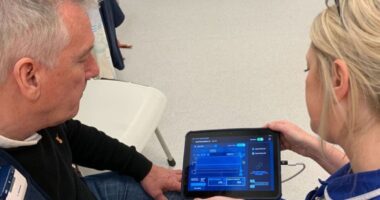Brits are being warned to look out for a telltale sign in the nose of a health condition that causes more than 75,000 deaths a year.
Hypertension is a medical condition that means that the heart has to work harder to pump blood around the body.
More commonly known as high blood pressure, it puts extra strain on the heart as well as other organs and the blood vessels and can cause damage.
It is also a factor in many serious health conditions and illnesses, including cardiovascular disease, kidney disease, strokes, heart failure and heart attacks.
And even more concerning is the fact that around one in three Brits are thought to be living with high blood pressure – with many people not even realising they have it.
This, along with the fact it is often symptomless, is why hypertension has earned a reputation as being a “silent killer”.
On its website, Public Health England says: “Often described as a ‘silent killer’ because it rarely causes symptoms, high blood pressure was responsible for around 75,000 deaths in 2015, according to the Global Burden of Disease report.”
The British Heart Foundation (BHF) adds: “High blood pressure rarely has noticeable symptoms. Many people with high blood pressure feel fine. But even if you feel fine, you should still have your blood pressure checked regularly.”
But there are some warning signs that affect some people with the condition.
According to the BHF, one such sign can appear in the nose – nosebleeds.
The NHS also says that nosebleeds are more likely to occur in people with high blood pressure.
However, it is worth noting that there is some debate around whether nosebleeds are directly caused by having high blood pressure.
One study, published in JAMA network in 2020, found that people with high blood pressure were 2.7 times more likely to need emergency care for nosebleeds than people with healthy blood pressure.
Separate research, recorded in the Journal of the Saudi Heart Association, measured the blood pressure of 80 people over three months and found that half the participants experienced regular nosebleeds.
Researchers concluded that high blood pressure did not cause nosebleeds, but the bleeding was more difficult to control in people with hypertension.
The BHF lists other signs of high blood pressure as:
- Blurred vision
- Shortness of breath
- Chest pain
- Dizziness
- Headaches.
The only way to be sure if you have high blood pressure is to be tested, either by your GP or using an at-home kit. If you are concerned about your blood pressure you should speak to your GP.










